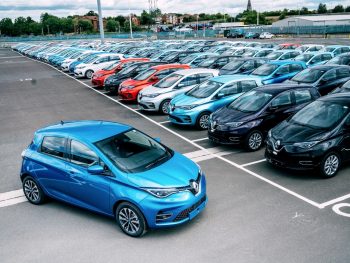Electrification creating ‘company car renaissance’
The switch to electric vehicles is prompting a “company car renaissance” as drivers turn away from cash allowances to benefit from low Benefit-in Kind rates.

The fleet sector has seen a revival of interest in both traditional company car and salary sacrifice schemes due to the 0% BiK that was introduced in 2020/21 for zero-emission cars
That’s the view of the Association of Fleet Professionals (AFP) on the back of latest HMRC figures indicating that take-up of company cars hit a low point in 2019/20 on the back of the punitive BiK rates in place at the time.
The recently published, provisional HMRC BiK data for 2019/20 show that there were some 800,000 drivers who received company car benefit.
It’s down by 70,000 or 8% from 2018/19 – the new HMRC data confirms last year’s provisional data that there were 870,000 BiK takers then.
The 2019/20 figure is also a 11.1% decline from the 900,000 company car BiK recipients reported for 2017/18. In fact, company car benefit take-up has been declining since 2016 due to high levels of taxation.
But since then, the fleet sector has seen a revival of interest in both traditional company car and salary sacrifice schemes due to the 0% BiK that was introduced in 2020/21 for zero-emission cars and which has only risen to 1% for the current tax year. BiK on zero-emission cars will also only rise to 2% in 2022/23 and is frozen at that level until 2024/25. And the low rates on plug-in hybrid cars are also proving to be a key attraction.
While the official HMRC data on company car benefit for 2020/21 isn’t due until summer 2022, the anecdotal evidence is that the BiK rates introduced last year have helped drive a return to company cars.
A further factor in the decline in HMRC’s figures on company car benefit uptake since 2016 is likely due at least in part to an issue with voluntary payrolling introduced for that tax year. While reporting became mandatory in 2018/19, HMRC found there was still evidence of non-compliance.
Commenting on the latest HMRC figures, Paul Hollick, chair, AFP, said: “This is quite a steep decline in company car numbers but, we believe, will probably be the low point. It is the predictable result of excessively high personal taxation being applied in recent years as well as some P11D BiK benefits being payrolled. Starting in the 2020/21 tax year, we expect to see the trend start to reverse, as the impact of very low taxation on electric vehicles starts to create a noticeable effect through both company car schemes and salary sacrifice initiatives. Our view is very much that electrification will create a company car renaissance.”
The new HMRC figures also show a continued fall in drivers still receiving the ‘free’ fuel benefit in 2019/20 – the total number stood at 90,000, down 18.2% from the 110,000 in 2018/19 and 35.7% from the 140,000 for 2017/18. The total taxable value of fuel benefit in 2019/20 is estimated to have been £470m, down from the £540m now confirmed for 2018/19.













Victor Harman10. Sep, 2021
There is no such thing as a zero emissions car,it’s just a piece of terminology that happens to be fiction.
Of course there are lots of people going into EVs and PHEVs as company cars, because their emissions figures
are fiction, particularly the PHEV CO2 emissions, and they offer benefits that are not justifiable..